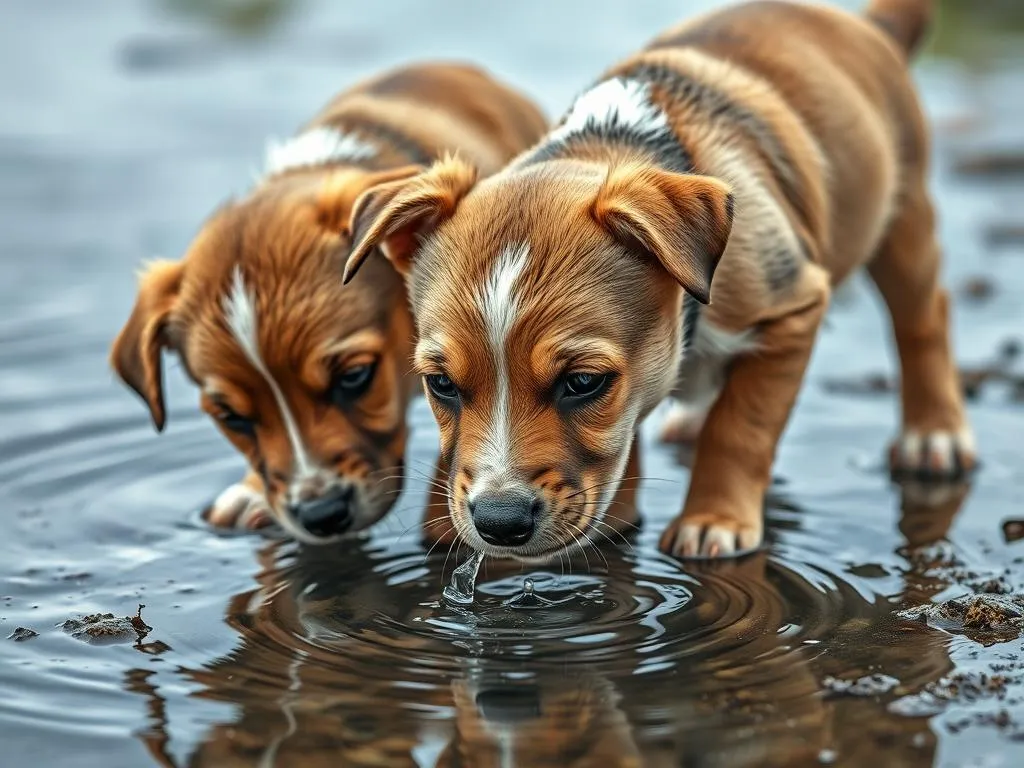
Introduction
Proper health care is essential for dogs, especially during their formative years. Puppies require special attention to ensure they grow up healthy and strong. One critical aspect of their health care is hydration, a topic that is often misunderstood among new pet owners.
Hydration plays a vital role in a puppy’s development. Water is necessary for digestion, nutrient absorption, and temperature regulation. As puppies explore the world, understanding when and how to introduce water is crucial for their well-being.
This article aims to inform dog owners about when can puppies drink water, provide insights into their hydration needs, and dispel common misconceptions regarding puppy hydration.
Understanding Puppy Development
Stages of Puppy Growth
Puppies undergo several critical developmental stages, each with unique needs:
-
Neonatal stage (0-2 weeks): During this period, puppies rely entirely on their mother’s milk for nourishment and hydration. They are unable to regulate their body temperature or consume food and water independently.
-
Transitional stage (2-4 weeks): At this stage, puppies begin to open their eyes and ears, becoming more aware of their surroundings. They still rely heavily on their mother’s milk, but they may start to show interest in solid food and water.
-
Socialization stage (4-12 weeks): This is a crucial time for learning and social interactions. Puppies start weaning off their mother’s milk and gradually transition to solid food and water.
Nutritional Needs in Each Stage
In the neonatal stage, the mother’s milk provides all necessary nutrients, including hydration. As puppies enter the transitional stage, introducing a small amount of water becomes essential. It prepares them for the next stage of their development, where they will consume solid food and require more hydration.
When Can Puppies Start Drinking Water?
Age Guidelines
Generally, puppies can start drinking water around 3-4 weeks of age. At this time, they are beginning to wean off their mother’s milk and are more curious about their surroundings. Introducing water at this stage helps them adjust to their new diet, as they will soon be eating solid food.
Factors Influencing Readiness
Several factors can influence when a puppy is ready for water, including:
-
Breed considerations: Some breeds may mature faster than others, impacting when they can start drinking water.
-
Health status: Puppies with health issues may require a more individualized approach to hydration. Always consult a veterinarian if you’re unsure.
How to Introduce Water to Puppies
Choosing the Right Water
Providing clean, fresh water is crucial. Puppies should have access to safe drinking water to prevent any health issues. Here are some recommendations on water types:
-
Filtered water: This is often the best option as it removes impurities that can harm your puppy.
-
Bottled water: If filtered water is not available, bottled water can be a good alternative.
-
Tap water: Tap water is generally safe, but check with local guidelines to ensure it meets safety standards.
Methods of Introduction
Introducing water to puppies can be done in several ways:
-
Using a shallow bowl: Start with a shallow, easy-to-access bowl to prevent drowning hazards. Puppies will instinctively explore and discover the water.
-
Mixing water with food: If your puppy shows reluctance to drink, try mixing a small amount of water with their food. This method can help them become accustomed to the taste and texture of water.
-
Offering water with a syringe: If your puppy refuses to drink, you can use a syringe (without a needle) to gently squirt water into their mouth. This method should be used as a last resort and under supervision to avoid choking.
Signs of Dehydration in Puppies
Recognizing Symptoms
As a puppy owner, it’s essential to be aware of the signs of dehydration:
-
Dry gums and tongue: One of the first symptoms of dehydration is a dry mouth. Check your puppy’s gums; they should be moist and pink.
-
Lethargy and decreased activity: If your puppy is less active than usual or seems tired, it could be a sign of dehydration.
-
Sunken eyes and loss of skin elasticity: Sunken eyes and a lack of skin elasticity can indicate severe dehydration. Gently pinch the skin on the back of the neck—if it doesn’t spring back quickly, your puppy may be dehydrated.
When to Seek Veterinary Help
If you notice any signs of dehydration in your puppy, it’s essential to seek veterinary help immediately. The severity of dehydration can vary, and a veterinarian can provide the necessary treatment to rehydrate your puppy safely.
Maintaining Hydration in Puppies
Daily Water Intake Recommendations
The amount of water a puppy needs can vary based on several factors, including size, age, and activity level. As a general rule of thumb, puppies should drink about one ounce of water per pound of body weight daily.
Factors Affecting Water Needs
Several factors can influence a puppy’s water intake needs:
-
Activity level: More active puppies will require more water to stay hydrated. Monitor their drinking habits, especially after playtime or exercise.
-
Temperature and weather conditions: Hot weather can lead to increased water needs. Ensure your puppy always has access to fresh water, especially during warm days.
Common Myths About Puppy Hydration
Myth 1: Puppies Don’t Need Water Until Weaning
This is a widespread misconception. Puppies can start drinking water around 3-4 weeks, even before fully weaning. Early hydration is crucial for their transition to solid food.
Myth 2: All Dogs Drink the Same Amount of Water
Not true! Water intake varies among breeds and sizes. Larger breeds generally require more water than smaller ones. Always monitor your puppy’s drinking habits to ensure they’re getting enough.
Myth 3: It’s Okay to Give Puppies Milk Instead of Water
While puppies benefit from their mother’s milk, giving them cow’s milk or other dairy products can lead to digestive issues. Puppies do not need milk after weaning; water should be their primary source of hydration.
Conclusion
Understanding when can puppies drink water is essential for any responsible pet owner. Proper hydration supports a puppy’s health and development, ensuring they grow into strong, healthy dogs. By introducing water appropriately and recognizing signs of dehydration, you can help your puppy thrive.
Always remember to consult with a veterinarian for personalized advice regarding your puppy’s hydration and health care. Regular check-ups and responsible pet ownership will contribute significantly to your puppy’s overall well-being.









